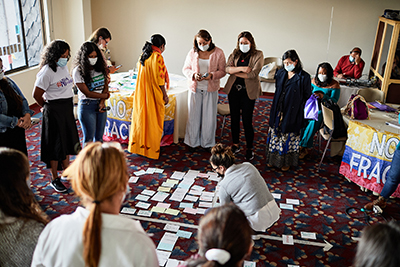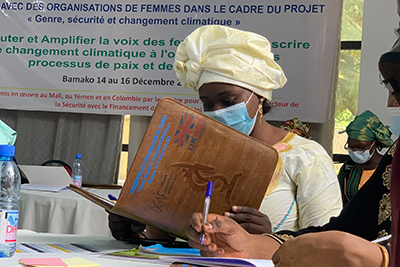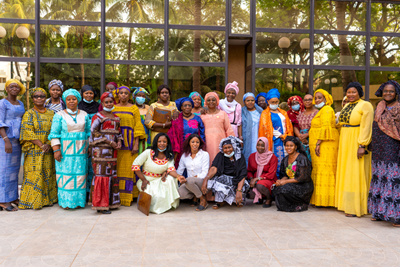Gender, Climate Change and Security
In many fragile and conflict-affected states, climate change endangers efforts to secure peace and security while deepening gender inequalities. A growing body of research recognises the gendered impacts of climate-conflict linkages. Women often bear the brunt of conflicts over land and natural resources, climate-related displacement, and gender-based violence (GBV).
With climate garnering attention in peace processes, peace building policy, and security sector reform, this is a critical moment to amplify women’s voices and experiences in how climate impacts increase their security risks, and to build understanding of how climate change policy and the Women, Peace and Security (WPS) agenda can be mutually reinforcing.

Project
Timeline of the project:
- Webinar: "Climate Change, Gender-based Violence: Implications for the Security Sector": January 2021. Read the report of the key issues raised in the webinar.
- National advocacy workshops on Gender, Security and Climate Change:
- Yemen (online): 15-17 November 2021
- Colombia (Bogota): 16-18 November 2021
- Mali (Bamako): 14-16 December 2021
- Publication of the Women’s Rights Organisations Advocacy Action Plans: Early 2022
- 3-way dialogue: “Exchanges between Colombia, Mali and Yemen: Finding similarities about the impacts of climate change on security from a gender perspective”: February 2022
- Global policy events and publications of international recommendations:
- Geneva, March 2022 (tbc)
- New York, March 2022 (tbc)

In the framework of the project on Gender, Climate Change and Security funded by the UK, three “Impactful Advocacy and Strategic Engagement Workshops” were organised in Colombia, Mali and Yemen at the end of 2021. The workshops aimed to build women’s rights organisations' capacity to advocate on the issue of climate change in their country’s peace and security processes. As a result, three advocacy action plans are being developed that women will present during national and international events for relevant policy makers. :
- Colombia: Bogota, 16-18 November, 28 women attended, more than 90% coming from outside of Bogota, coming from many different regions of Colombia
- Mali: Bamako, 14-16 December, 33 organisations have attended, the Malian coalition on Climate Change, Gender and Security has been informally launched
- Yemen: hybrid format, 17-19 November, 5 clusters of women gathered in regional hubs across the country, attending online sessions in the morning and participating in working group meetings in person in the afternoon




They attended the workshops:
- Colombia: Alianza Colombia Libre de Fracking (Cesar), Mujeres Trenzadoras, Alianza Colombia Libre de Fracking (Antioquia), Comité Defensa Ambiental, Asociación de Mujeres Negras, Indígenas y Campesinas (AMUNIC), Consejo Comunitario La Toma, Comité por la Defensa del Agua, la Vida y el Territorio - Aguawil, Liga Internacional de Mujeres por la Paz y la Libertad (LIMPAL), Fuera de Mujeres Wayuu, Colombia Diversa, Organización Grupo Femenina, Mesa Nacional de Mujeres Negras, Afrocolombianas, Raizales, Palenqueras, Resistencia a la Minería, Guardianas de la Naturaleza, Red de Mujeres Municipal El Paso (ANUC), Organización Nacional Indígena de Colombia (ONIC)
- Mali: Association des Femmes pour les Initiatives de Paix (AFIP), Réseau des femmes pour les droits environnementaux (REFEDE), Réseau des Femmes Africaines Ministres et Parlementaires (REFAMP), Réseau Ouest Africain pour l’édification de la Paix (WANEP) et sa branche WIPNET, Réseau FEMNET,Plateforme des femmes du G5 Sahel, Institut Malien de Recherche Action pour la Paix (IMRAP), Coordination des Associations et ONG Féminines du Mali (CAFO), Al baraka, Réseau Paix et Sécurité pour les femmes de l’espace CEDEAO (REPSFECO), Cadre de concertation des femmes des partis politiques (CCFPP), Association pour la Promotion de la Femme et de l’Enfant au Mali (APROFEM), Association pour le progrès et la défense des droits de la femme (APDF), Femmes Droit et Développement en Afrique (WILDAF Mali), Collectif des Femmes du Mali (COFEM), Groupe de Recherche, d’Etude, de Formation Femme d’Action (Greffa), Association pour la Sauvegarde de l’Environnement et le Développement au Sahel (ASEDS), ONG Jiguiseme, Développement Intégration et Valorisation du rôle de la Femme (DIVAROF), Coalition de la société civile pour la Paix et la lutte contre la Prolifération des Armes Légères (CONASCIPAL), Association Recherche Action Femme et Développement (ARAFD), AFAD - Association de Formation et d’Appui au Développement, Association des Femmes Entrepreneures du Mali (AFEM), Association des Femmes Leaders de Tombouctou, Association Malienne d’Appui aux initiatives locales (AMAIL), Forum des femmes actives pour les objectifs de développement durable et l’émergence (FAODE), Observatoire des Droits de la Femme et de l’Enfant (ODEF), Pôle des Actions d’Intégration des Droits Humains en Afrique (PACINDHA Mali), Union pour Avenir Écologique et Solidaire (UAVES), Association pour la Défense des Droits de l’Environnement et de l’Homme (ADDEH), Plateforme Nationale des Acteurs de la Société Civile sur le Climat, l'Environnement et le Développement Durable (PNASC-CED), Association de Formation et d’Appui au Développement (AFAD), Fédération des Associations de Femmes Rurales, Fédération Nationale des Collectifs d’Organisations Féminines du Mali (FENACOF), Association des Femmes Leaders de Tombouctou
- Yemen: Peace School of Development, Sanad, Enjaz Foundation for Development, Green Hands Initiative, Woogood Foundation for Human Security, Al Aidaroos Women's Development Association, Yemeni Women's Union - Abyan, Southern Women for Peace Group, To Be Foundation for Rights and Freedoms, Food for Humanity Foundation, Al-Ikha Association for Development and Peace, Kainuna International for Development, Meemz Art Initiative, Strategic Research Centre for Women and Child Support, Change Horizon Forum, Nature Conservation Initiative, Cleaning and Development Fund, Marib Girls Foundation, Yemeni Women's Union - Marib, Socotra Woman Foundation for Development and Response, Socotra Women’s Association
Photo: Camilo Bernal - En Algún Lugar, MaliniumPictures
In many fragile and conflict-affected states, climate change endangers efforts to secure peace and security while deepening gender inequalities. To better understand these links, DCAF brought together women in Yemen, Mali and Colombia to share experiences, build knowledge and shape their policy agenda.
As a result, DCAF produced six short videos featuring women’s voices as they explore what the gender, climate change and security nexus means for them:
- Amplifying Women’s Voices,
- Double Burden of Climate Change and Gender Inequality,
- No Food, No Peace,
- Listening to Voices for Peace,
- Focus on Yemen – Climate Activism Under Siege, and
- Focus on Mali – A Question of Survival
They are available in English, Arabic, French and Spanish.
Watch the first video below or the six videos on YouTube
PUBLICATIONS
Contacts
Gender & Security Division (gender@dcaf.ch)



